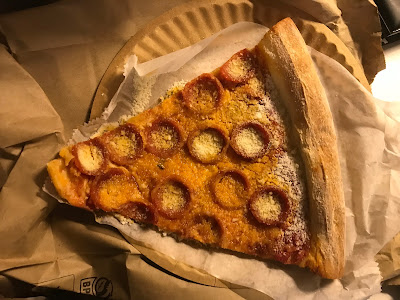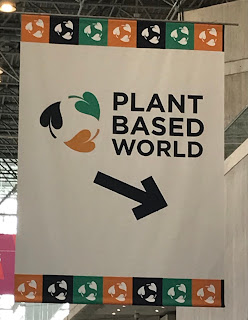There’s only one thing better than a New York triangular pizza slice loaded with cupped pepperoni and lots of sprinkled on parm to absorb all the oil. That’s a Chicago crispy thin crust pizza cut into squares.
That New York slice was thoroughly enjoyed Thursday afternoon, the first day of Plant Based World North America being held in Manhattan at the Javits Center. Here are five observations from the expo and educational sessions.
1. As hungry as I was at 1:00pm, I was not going back for a second round of sampling on the show floor. The vegan cheesy pizza I tried reminded me of frozen Mama Celeste, which was popular in the 70s - 90s and featured carboard-like crust with bland tomato sauce and imitation mozzarella. A quick search for an original ingredient statement showed the three key ingredients in the imitation mozzarella were water, palm oil and potato starch, not much different than the base of many of the plant-based options on the expo floor.
But I have to say, a number of the branded plant-based dairy and meat alternatives I sampled showed a major improvement in taste, texture and smell from last year. Accolades to Nourish LLC for its vegan Artisan Brie line and French Onion Spread. Very tasty products and I would buy them.
2. Taste was the consensus as the deciding factor to repurchase a plant-based product, according to research presented by Steve Markenson, vice president-research and insights, FMI. And guess what, lots of consumers like, even often prefer, the taste of dairy milk alternatives.
Older consumers are more aware of other attributes and will often weigh them into the decision to try a plant-based product and then repurchase it. Price, nutrition and complicated ingredient statements all come into play.
3. But with Gen Z, taste and reviews on social media reign, as well as a brand’s stance on various issues. Gen Z was represented by Heidi Diaz, a marketing major at Western Connecticut State University. She was part of a panel discussion titled “The Next Generation: Decoding Gen Z’s Palate and Crafting Authentic Connection.”
“Gen Z will not compromise on taste,” she said. And more often than not, Gen Z researches a new product on social media to see if it aligns with their values regarding sustainability, health and ethical sourcing. Diaz emphasized that it is paramount that brands be active on social media. “We are always connected,” she said.
When it comes to taste, Gen Z also likes different flavors and foods from different cultures, according to Jennifer DiFrancesco, director of culinary innovation at Sodexo. She works closely with college foodservice programs.
4. This is big. Sodexo has very aggressive plans with getting plant-based foods into the mouths of university students through both unlimited food hall dining and pay-for-what you take programs. With some entrees, plant-based protein is the default. If a student wants meat, they have to request it.
In other instances, “We look at having equitable options,” said DiFrancesco. In other words, if a spicy crispy chicken sandwich is on the menu, a plant-based option is also there.
While she did not mention pizza, I cannot help but guess that if you put a slice of the real deal next to one with plant-based cheese, visually, the real deal will win. And there’s no comparison in taste, yet!
Sodexo also hosts pop-ups on campuses featuring plant-based foods. A recent one was for vegan (milk)shakes.
In April, Sodexo put numbers to its commitment to lead the movement toward plant-based dining. Currently, 36% of Sodexo campus’ menus are plant-based, and the company is committed to increasing that number to 50% by 2025. Note: Sodexo’s definition of plant-based is recipes that only use ingredients that come from plants, such as fruits, vegetables, whole grains, legumes and nuts. It can include honey and sugar.
5. Here’s where it gets a little ugly. Nutrition, namely protein content, is not being addressed or communicated. In fact, I posed the question about complete protein to the panel. A member of the audience verbally charged at me and said the need for complete protein is a myth debunked 20 years ago (sure, by pseudo medicine!).
Panelist DeAndra Forde, a nutritionist and graduate student at Drexel University, responded, “vegan and vegetarianism does not equate to good health.”
Thanks DeAndra! In an online interview that you can read HERE, she said, “Most natural sources of B12 (cobalamin) are found in animal sources--meats and dairy--so supplementation is very important. Inadequate amounts of B12 can lead to neuropathy.”
“You can eat a bag of chips and be vegan, you can eat clean and also be vegan. But it’s about taking the next step to know what plant-based foods can come together and make a complete protein.”
Panelist Rachel Sherman, project manager at the Drexel Food Lab at Drexel University, said that her department actively reaches out to students to access their food preferences. “They want less processed and more vegetable-forward meals,” she said.
We all need to eat more fruits and vegetables. How about with some cheese? a glass of milk? a cup of yogurt? on a thin crust cut into squares! Just something to think about.




No comments:
Post a Comment